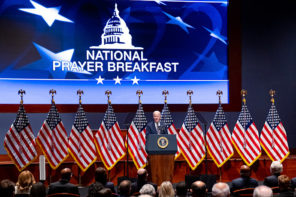What inspired you to write it? What sparked your interest (person, event book)?
After what I considered the disastrous reelection of President George Bush in 2004, I began to ponder the implications of the fact that the more often a person went to church, the more likely she was to vote for the president. We were developing two political blocs: a pro-God and an anti-God coalition, roughly Republican and Democratic. While there was some overlap—there were of course many believing Democrats—this belief division was true to a dangerous extent and it undermined the possibility of a genuinely popular, progressive political movement.
At the same time, in constitutional law, Americans were being told by both the left and the right, by both Ronald Dworkin and Antonin Scalia, that we had to choose whether we were a secular society that tolerates religion or a religious society that tolerates non-belief. This was all the worst kind of identity politics.
Finally, rapidly growing secularism, especially among the young, was being fed anti-religious propaganda by Christopher Hitchens and the other “New Atheists.” I was a part of this secularism, having fallen away from a Yeshiva upbringing, but I saw this reflexive hostility toward religion as leading to materialism, relativism, and nihilism among secularists.
In a trilogy of books on the public and private roles of religion and secularism, I have tried to counter these trends. In American Religious Democracy in 2007, I defended religious beliefs in politics against the charge of theocracy. In Hallowed Secularism in 2009, I described a path to a secularism very close to the religious traditions. And now, in Church, State, and the Crisis in American Secularism, I interpret the Establishment Clause to permit government use of religious imagery in the service of commitments, such as objective values, that transcend the religious/secular divide.
What’s the most important take-home message for readers?
There is no chasm between religious belief and non-belief, certainly not in terms of politics and not even in personal terms. For example, the reference in the Declaration of Independence to “unalienable rights” with which we are endowed by our “Creator” was not understood at the time as a claim about the existence of God but about the reality of rights. Are rights in some sense real or are they just gifts from government? This is a question for all of us, for my fellow secularists as well as for believers. The national motto, In God We Trust, raises the question whether reality is trustworthy or is just random events? These questions have nothing to do essentially with the existence of supernatural beings. There is a great deal of common ground possible here. We don’t have to choose between being a secular nation or a religious one.
Is there anything you had to leave out?
In three books, I said everything I had to say. Now comes the opportunity to engage secularism and try to broaden it.
What are some of the biggest misconceptions about your topic?
The misuse of terms like “reason.” All human beings employ faith commitments of various kinds. It cannot even be conclusively established that there is a mind-independent reality “out there.” So, when secularists claim that they live lives based on reason whereas religious believers base their lives on faith, they are just fooling themselves. We would do better to examine our faith commitments with humility and try to understand ourselves better.
Did you have a specific audience in mind when writing?
Clearly, my intended audience is non-believers. I want to see a secularism more open to religious imagery and the wisdom that it contains for living. Since my constitutional analysis permits more mixing of church and state than the doctrine of separation would suggest, some religious believers like the book and have pushed for its acceptance. But in my own mind, I am defending a genuine government neutrality toward religion.
Are you hoping to just inform readers? Give them pleasure? Piss them off?
I wrote this book to change the world, both in the courtroom and in the culture. For years now, Establishment Clause doctrine has been stuck trying to answer the divisive Dworkin/Scalia question. I am trying to help us get beyond the formulation of religion versus secularism to find common ground.
What alternative title would you give the book?
My original title was “Higher Law in the Public Square” but Indiana University Press found that a little obscure. Still, the higher law tradition has always included believers and non-believers, so it had advantages as a title.
How do you feel about the cover?
I love the cover though I had nothing to do with it. The State Capitol and a church were obvious symbols to capture my meaning and IUP used color very effectively. It’s sort of a little red book.
Is there a book out there you wish you had written? Which one? Why?
I wish I had written Andre Comte-Sponville’s The Little Book of Atheist Spirituality. If more non-believers read that book, we would find it easier to talk with each other and with religious believers. We would also be happier and more fulfilled.
What’s your next book?
No book soon, that’s for sure. I hope to be able one day to write a serious book challenging the assumptions of capitalism on behalf of a resurgent Marxism.




